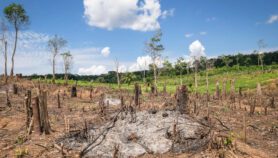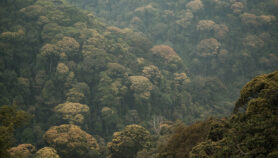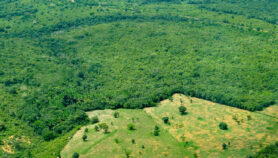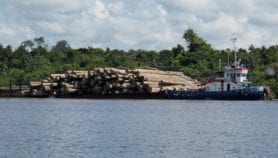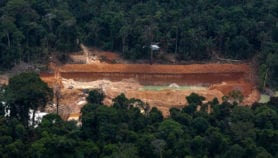By: Ehsan Masood
Send to a friend
The details you provide on this page will not be used to send unsolicited email, and will not be sold to a 3rd party. See privacy policy.
Preserving healthy ecosystems is essential for alleviating global poverty and achieving sustainable development, according to a major review of the state of the world’s ecosystems that was released yesterday (30 March).
Delivering a stark message to policymakers in developing countries, the Millennium Ecosystem Assessment says that human activities such as agriculture and industrial development are putting a potentially irreversible strain on ‘ecosystem services’ that are central to human wellbeing.
Forests, for instance, help regulate climate by absorbing the greenhouse gas carbon dioxide, prevent erosion by holding soil together, and reduce the risk of floods by controlling the flow of water into rivers. They also provide products such as timber and medicinal plants.
The report says that the decline in forest cover, the expansion of agricultural land and the loss of wildlife will have an adverse impact on food security and even industrial development in the poorest countries.
Food supplies, for example, are likely to be reduced by overfishing and the loss of ecosystem services linked to agriculture, such as pollination and pest control provided by insects and other animals.
The report says that the Millennium Development Goals, a series of eight global targets to reduce poverty and disease by 2015, will not be met unless, among other measures, steps are taken to reverse ecosystem decline.
It urges governments to put a monetary value on ecosystem services, to help them better understand the implications of ecosystem loss and persuade them to invest in the measures needed to prevent this decline.
“Any progress in addressing the Millennium Development Goals is unlikely to be sustained if most of the ecosystem services on which humanity relies continue to be degraded,” said Angela Cropper, co-chair of the assessment’s scientific panel and a former executive secretary of the UN Convention on Biological Diversity.
Cropper was speaking in London at the report’s UK launch. The document was also launched on the same day at events in Egypt, France, Japan, Malaysia and South Africa.
The assessment’s conclusions have been endorsed by the World Bank, and several UN agencies and international conservation groups, all of which helped to fund it. The governments of China, Norway, Saudi Arabia and Sweden were also among the assessment’s biggest donors.
Eight of the world’s largest conservation groups signed a joint statement supporting the assessment’s findings.
“The Millennium Ecosystem Assessment brings ecosystems back to the heart of development decision-making by documenting how much we gain from nature every day in the form of ecosystem goods and services,” said Achim Steiner, director general of the World Conservation Union (IUCN), one of the signatories. “They are literally the foundation for the livelihoods of millions of the poorest.”
Walter Reid, director of the assessment, said that it had been undertaken on a scale similar to that of the Intergovernmental Panel on Climate Change (IPCC).
More than 1,300 scientists from 95 countries contributed to the report. In addition, some 800 experts commented on early drafts. The total cost of the four-year exercise came to US$24 million.
However, Jonathan Lash, president of the World Resources Institute (WRI), a conservation policy think tank based in Washington DC, United States, admitted that, unlike the IPCC, the Millennium Ecosystem Assessment had not been requested by governments in search of scientific advice.
The idea for the assessment, he said, originated nearly a decade ago among several large conservation groups (including the WRI) that felt that policymakers, particularly in developing countries were paying insufficient attention to scientific assessments of the loss of biodiversity.
The organisations convinced UN agencies that a major review of the research was needed to convince policymakers that conservation should not be ignored in the quest for economic development.
In order to gain the trust of developing countries in the project, however, the assessment’s founders decided to involve a significant number of scientists, conservation groups, the business community, representatives of indigenous peoples and policymakers from developing countries — in addition to senior executives from the UN.
According to Abdul Hamid Zakri, director of the Institute of Advanced Studies at the United Nations University in Tokyo, Japan, and co-chair of the assessment’s overall steering group, 30 per cent of the scientists involved in the assessment are from developing countries.
Zakri told SciDev.Net that the worst ecological degradation was found in some of the poorest developing countries – particularly in the world’s arid and semi-arid regions, which are home to some two billion people.
“I want to appeal to developing countries to take a close interest in our findings and to act on them,” said Zakri, who is Malaysia’s former delegate to the UN biodiversity convention.
The report’s conclusions are based on a review of existing research (such as the Red List of Threatened Species). They include the following:
- Economic development has led to ecosystems being degraded more rapidly and extensively during the past 50 years than at any previous period in history.
- Some 60 per cent of ecosystem services examined in the assessment are being degraded or used unsustainably.
- More land has been converted to agriculture in the past 50 years than in the previous two centuries.
- More than 50 per cent of all nitrogen fertiliser use has taken place in the past two decades.
- The international community needs to make environmental protection a top priority if it wants to meet the Millennium Development Goals.
The Millennium Ecosystem Assessment report Ecosystems and Human Well-being: A framework for assessment is the first in a series of documents to be published throughout 2005. The others will focus on specific aspects of the Millennium Ecosystem Assessment such as wetlands and biodiversity.
Read more about biodiversity in SciDev.Net’s biodiversity dossier.




